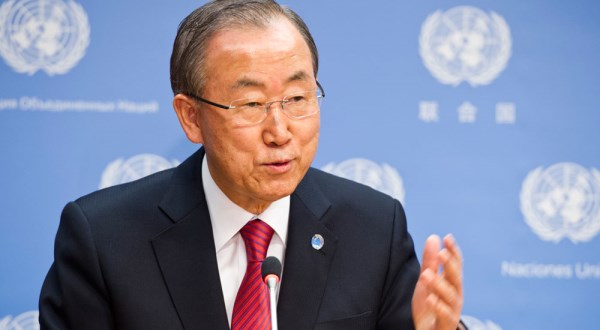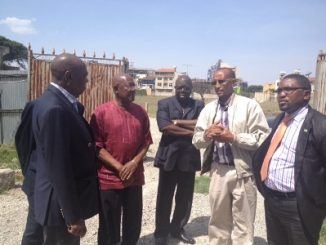
Remarks at the opening of the 58th Session of the Commission on the Status of Women
Secretary-General Ban Ki-moon, UN Headquarters, 10 March 2014 :
I am delighted to be with you again. I thank you for your taking part in this very important commission of CSW. And thank you for your taking time, particularly, Ministers and all the distinguished delegations, who are coming from a long way to show, to demonstrate your leadership.
And I am also very happy to work with the new [chairperson], Ambassador [Libran] Cabactulan, whose leadership will clearly lead this commission meeting to a great success for enhancement of women’s rights and gender empowerment.
This is always one of the most invigorating dates on my calendar.
It is my special pleasure today to introduce you to the new Executive Director of UN Women, Ms. Phumzile Mlambo-Ngcuka.
She has a crucial role in promoting gender equality and the empowerment of women and girls throughout the UN system and the world. And I am very happy to work with such a distinguished and committed leader who has been showing and demonstrating her leadership for very important causes, on which we have been working together.
Gender equality and [women’s] empowerment – these are among my top priorities, and they are central to achieving the Millennium Development Goals and the success of the post-2015 development agenda.
We have come a long way but there is much still to do – and little time to do it.
More girls are in school, but we are far from ending gender disparity at all levels of education.
Gender gaps are particularly stark among rural populations and for persons with disabilities, indigenous peoples, and other marginalised groups.
We must also focus on quality education – and preparing girls and women for the 21st century job market.
There has been progress in narrowing the gap in employment between women and men.
But women are more likely to be in vulnerable employment with low pay, poor working conditions, no health or pension benefits, and no protection by labour laws.
Women also still earn less than men for doing the same work.
Women also remain scarce in corporate leadership, despite research that has consistently shown that companies with more women on board perform better.
We also know that nations with more gender equality have better economic growth.
We need actions and policies that nurture and include women’s talents, skills and energy from the factory floor to the boardroom.
We also need to see more women in government.
The share of women in national parliaments has increased in several regions.
But deep inequality persists at all levels of representation.
Globally only about one in five parliamentarians is female, despite evidence that parliaments with more women take up a wider range of issues – including health, education, anti-discrimination, and child support.
Here at the UN, I am committed to gender equality and women’s leadership.
Today, the top development, human rights and humanitarian officials of the United Nations, and the heads of disarmament, peacebuilding support and peacekeeping support, are all women.
They represent a growing list of women leaders at the United Nations System, including my own Chief of Staff, the head of the World Food Programme, the leader of UNESCO, the head of the Syrian chemical weapons destruction mission, and, of course, the Executive Director of UN Women, whom I introduced. And we have at least five women leaders who are commanding peacekeeping operations. The perception of this world is that women cannot handle soldiers, the troops. But there are five women who are commanding many thousands peacekeeping [personnel]. They are in South Sudan, Côte d’Ivoire, Liberia, Cyprus and Haiti. They are all women. And I have also appointed Mrs. Mary Robinson as the first woman peace negotiator in DRC. You should be proud.
I am committed to lead by example.
Ladies and gentlemen,
One area where we are far behind schedule is sanitation.
Each year, more than 800,000 children under five die needlessly from diarrhoea.
More than 2.5 billion people lack the benefits of adequate sanitation.
More than a billion people practice open defecation.
Providing adequate sanitation and ending open defecation would significantly reduce ill-health and environmental pollution.
It would also enhance the personal safety of women and girls who often risk sexual abuse for lack of a safe, clean toilet.
And proper sanitary facilities in schools have been shown to significantly boost girls’ school attendance.
The Call to Action on Sanitation aims to end open defecation by 2025 by providing all people access to sanitation.
Another crucial area of focus is maternal and child health.
Child deaths are dropping significantly, but too many children still die needlessly before the age of five.
The number of women who die each year from pregnancy and childbirth has dropped by almost half, but too many women still die every day due to pregnancy-related causes.
Almost all of them are from developing countries. Almost all of them can be cured from preventable diseases.
These deaths are largely preventable.
We know what works.
The Every Woman, Every Child movement is working to scale up results.
The United Nations is also committed to helping Governments provide the education and quality sexual and reproductive health services that too many women and adolescent girls lack.
We must ensure their reproductive rights.
A girl who becomes pregnant is more likely to have grave complications in childbirth or a sickly child.
And a girl who is not empowered is more at risk of disease.
More young women are infected with HIV than young men.
Fewer young women know how to prevent HIV and have the power to negotiate condom use.
Violence against women continues to plague the response to HIV.
And it causes untold damage to societies everywhere.
Our UNiTE to End Violence Against Women campaign works with women and men to raise awareness and change attitudes, customs and practices.
Men and boys have a vital role.
That is why I have established a network of men leaders to speak out against violence.
And it is why I have recently given my wholehearted support to the campaign to end female genital mutilation.
Last week I met an extraordinary young woman in London.
Her name is Fahma Mohammad.
She is leading a global campaign against this barbaric and unjustifiable practice that causes so much needless suffering.
I was deeply moved by her strong voice and clear message and will continue to speak out.
Ladies and gentlemen,
You have an important task before you.
Less than two years remain to the MDG deadline.
In that time we must also define a post-2015 development agenda.
I count on your wisdom and commitment to bring the voices of women and girls to the table.
I count on you to champion the human rights of all women and girls.
You can count on my full support.
We cannot achieve a world of dignity for all until we end gender inequality in all its forms.
Thank you for your commitment and leadership.




Leave a Reply